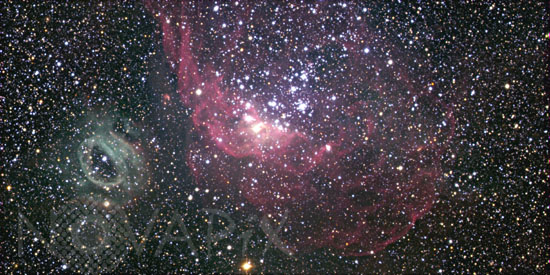Photo Agency - Astronomy - Space - Nature

NGC 2014, Henize 55 in the Large Magellanic Cloud
author: Anglo-Australian Observatory/David Malin Images/Novapix
reference: a-neb80-70091
Image Size 300 DPI: 34 * 17 cm
The nearby Large Magellanic Cloud (LMC) is a very active star-forming galaxy. The most massive region of star formation is around 30 Doradus (the Tarantula nebula) which can be seen with the unaided eye, but hundreds of lesser examples are visible with a telescope. This picture shows one of the more intriguing, NGC 2014 (Henize 55). It contains cluster of hot, young stars, almost hidden in the brightest part of the nebula. The energetic ultraviolet light from these stars is absorbed by hydrogen and produces the distinctive red glow from an enormous distance around the cluster.
As well as radiating strongly in ultraviolet light (a result of their high temperature) massive young stars also produce vigorous stellar winds. Eventually they will disperse the hydrogen around them, evacuating a bubble-like nebula. To the left of the main cluster a single star has begun this process, creating a strange hollow shape.
This picture was made using an early CCD camera on the AAT in Siding Spring.
As well as radiating strongly in ultraviolet light (a result of their high temperature) massive young stars also produce vigorous stellar winds. Eventually they will disperse the hydrogen around them, evacuating a bubble-like nebula. To the left of the main cluster a single star has begun this process, creating a strange hollow shape.
This picture was made using an early CCD camera on the AAT in Siding Spring.
Contact : Stéphane Aubin +33-(0)9-51-26-53-76
© Novapix - All rights reserved


